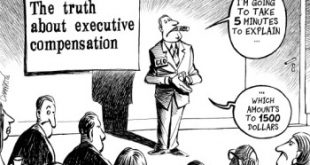from Neva Goodwin and RWER issue #84 The need for reform is huge – seemingly overwhelming. Yet the motives for reform are springing up all over the place. Maybe this is a moment to be a Pollyanna, rather than a Cassandra: Yes, we face disasters on every front – political, environmental, social – but, as was long ago remarked, nothing so concentrates the mind as the prospect of hanging. The public purpose economy is staggering under the need for reform in education and politics, while the...
Read More »Krugman’s formalization schizophrenia
from Lars Syll In an article published last week, Nicholas Gruen criticized the modern vogue of formalization in economics and took Paul Krugman as an example: He’s saying first that economists can’t see what isn’t in their models – whereas Hicks and pretty much every economist until the late twentieth century would have understood the need for careful and ongoing reconciliation of formal modelling and other sources of knowledge. More shockingly he’s saying that those who smell a rat at...
Read More »By the 1990s, economics was a social scientific discipline fast retreating from a public role
from Michael Bernstein and RWER #84 The transformation of the American political landscape in the wake of Vietnam era had subverted the very foundations of the liberalism that had made sense out of a genuinely public economics. An emphasis on political economic issues that had framed the high tide of activist government since the Great Depression of the 1930s had provided a community of professionals with both the means and the ends to deploy their expertise. As soon as social issues...
Read More »The main reason why almost all econometric models are wrong
from Lars Syll Since econometrics doesn’t content itself with only making optimal predictions, but also aspires to explain things in terms of causes and effects, econometricians need loads of assumptions — most important of these are additivity and linearity. Important, simply because if they are not true, your model is invalid and descriptively incorrect. And when the model is wrong — well, then it’s wrong. The assumption of additivity and linearity means that the outcome variable is,...
Read More »There are no markets without governance and government and regulations.
from James Galbraith and RWER #84 . . . there are no markets without governance and government and regulations. More precisely: just as Adam Smith pointed out that the division of labor depends on the extent of the market, so the extent of the market depends on the reach of the state – on its capacity to provide security, a framework of law and justice, and to regulate effectively in the public interest. Without each of these, many if not most modern markets could not exist in their...
Read More »Marginal productivity theory
from Lars Syll The correlation between high executive pay and good performance is “negligible”, a new academic study has found, providing reformers with fresh evidence that a shake-up of Britain’s corporate remuneration systems is overdue. Although big company bosses enjoyed pay rises of more than 80 per cent in a decade, performance as measured by economic returns on invested capital was less than 1 per cent over the period, the paper by Lancaster University Management School says. “Our...
Read More »Why the euro cannot be saved
from Lars Syll The euro may be approaching another crisis. Italy, the eurozone’s third largest economy, has chosen what can at best be described as a Euroskeptic government. This should surprise no one. The backlash in Italy is another predictable (and predicted) episode in the long saga of a poorly designed currency arrangement, in which the dominant power, Germany, impedes the necessary reforms and insists on policies that exacerbate the inherent problems, using rhetoric seemingly...
Read More »Trade: It’s about class, not country
from Dean Baker There is a fundamental flaw in the way that both Donald Trump and his critics generally talk about trade. They make it an issue of country versus country, raising the question of whether China, Canada and other trading partners are treating the United States fairly as a country. Trump of course does this more explicitly with his “America First” rhetoric and complaints about other countries cheating us because they run trade surpluses, but his critics also often use similar...
Read More »Worker rights in the United States
from David Ruccio Ambassador Nikki Haley’s decision last week to withdraw the United States from the United Nations Human Rights Councilis remarkable. The United States is the first nation in the body’s 12-year history to voluntarily remove itself from membership in the council while serving as a member. Some have alleged that the timing of Haley’s decision is conspicuous. “The move,” read the second paragraph of a CNN report on Haley’s decision, “came down one day after the Office of the...
Read More »Noah Smith’s unicorn defence of economics
from Lars Syll Unlike the old neoclassical theories, game theory concerns strategic interaction between different people. It can encompass things like wage bargaining, fraud and lots of other things that neoclassical equilibrium glosses over or leaves out. And in game theory, free markets full of rational actors can easily, even regularly, lead to inefficient outcomes that require government intervention. Noah Smith/Bloomberg “Free markets full of rational actors.” Sounds great does it...
Read More » Real-World Economics Review
Real-World Economics Review






